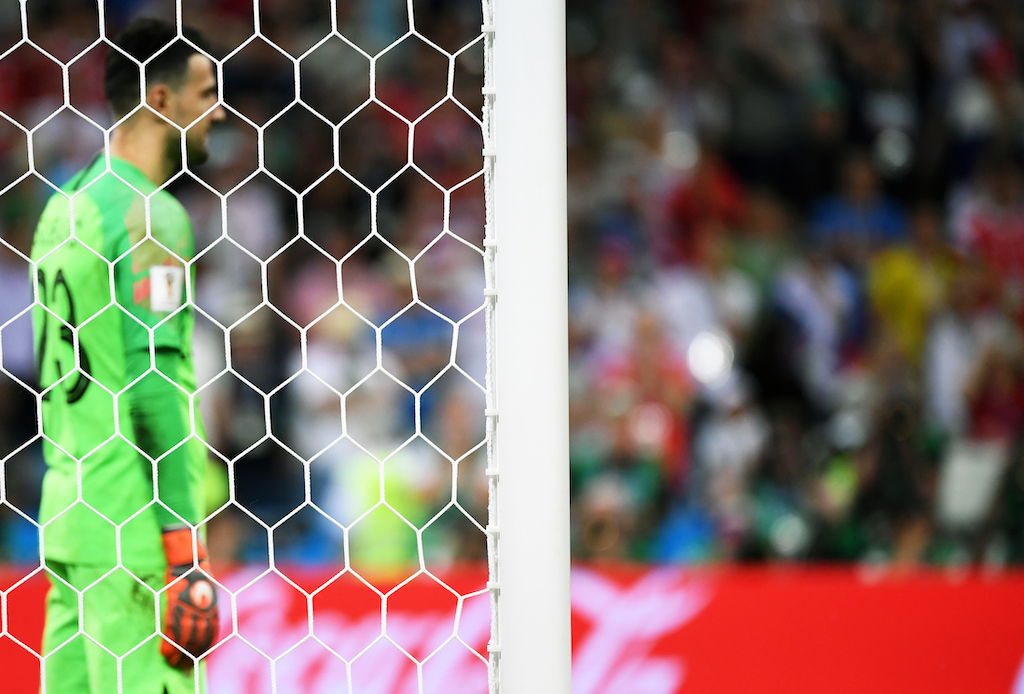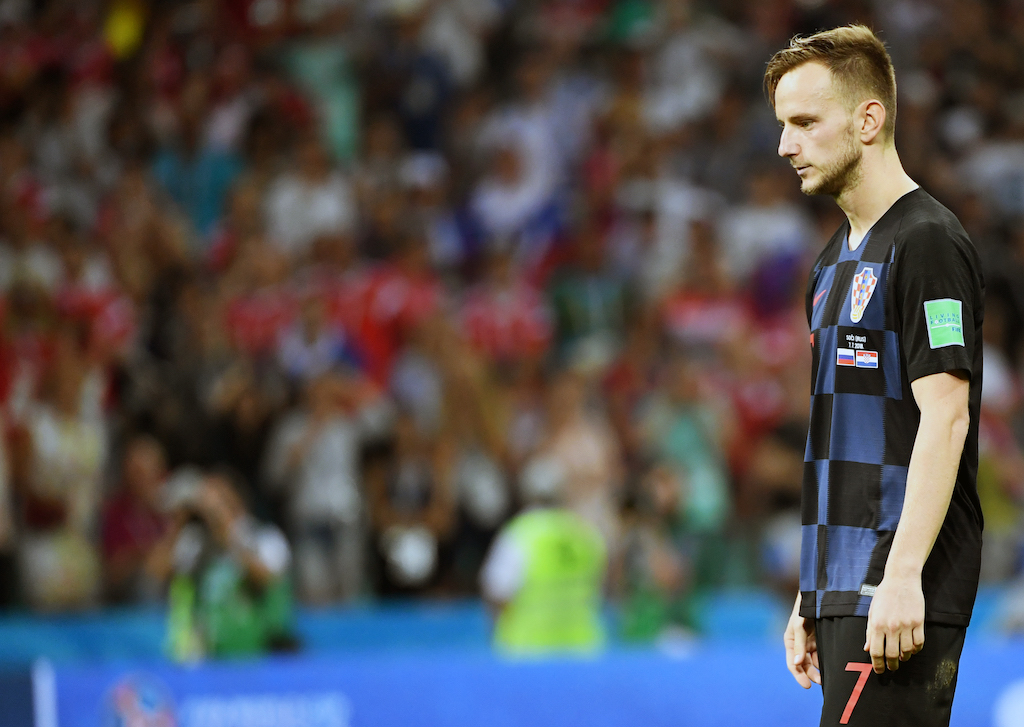Euro 2020 Qualifiers: Croatia Crushes Slovakia in Trnava (0:4)
September 6, 2019 - Croatia and Slovakia met in Trnava on Friday night as part of the Euro 2020 qualifiers. Three thousand Croatia fans made the trip to Slovakia to cheer on the 2018 World Cup finalists.
The Croatia national football team returned on Friday to kick off the next round of the Euro 2020 qualifications. There are five games scheduled over the next three months, each of which could be decisive for Croatia’s spot in the competition next summer. The first in the series was played on Friday in Slovakia, which is followed by a visit to Baku against Azerbaijan three days later.
Croatia had an opportunity to move to the top of the group with Hungary, though Slovakia had the same plan in mind. Recall, Slovakia opened the qualifiers with a win against Hungary and a loss to Wales, but thanks to a 5:1 victory in Azerbaijan, they had a better goal differential than Croatia going into Friday’s qualifier.
The World Cup finalists had not proven their true worth during these qualifications, though their win against Wales in Osijek gave coach Zlatko Dalic a bit of ease this summer. On Friday, however, Croatia was left without Ivan Rakitic and Mateo Kovacic, and a back injury for Tin Jedvaj put Croatia’s defense into question even more.
Croatia went into Friday’s game without the superstar lineup of the World Cup - and the starting 11 featured only captain Luka Modric, Dejan Lovren, Domagoj Vida, Ivan Perisic, Marcelo Brozovic, and Ante Rebic from the silver-medalist squad. Dalic instead had to rely on Dinamo goalkeeper Dominik Livakovic in goal, Karlo Bartolec and Borna Barisic in the defense, and Nikola Vlasic and Bruno Petkovic in the attack.
Croatia had their first real chance of the game in the 8th minute when Modric shot over the goal, which was followed by a Brozovic crossbar moments later. Livakovic saved Slovakia’s first chance at goal in the 11th minute.
Croatia came out playing the attacking game Dalic said they would, and spent most of the first half pressuring Slovakia’s defense. However, Croatia’s biggest chance came in the 28th minute off a Modric corner when Vida missed directly in front of the goal. Croatia had three corners to Slovakia’s zero by then.
Petkovic dribbled through Slovakia’s defense in the 30th minute for a one-on-one chance with the keeper, though the goalie’s leg saved his weak shot. Just four minutes later, Perisic hit the crossbar - and in the 37th minute, Petkovic missed another chance from the penalty area.
Opportunity after opportunity, Croatia was left without luck, that is, until the 45th minute when the young Nikola Vlasic nailed a goal in the far corner for 0:1 Croatia at the half.
The World Cup finalists kept their momentum in the second half, which shocked all spectators as a goal by Ivan Perisic increased the lead to 0:2 in the 46th minute!
Slovakia had a chance in the 51st minute, which Livakovic had no problem saving. Petkovic had yet another chance a few minutes later but hit over the goal. An incredible play between Rebic and Perisic saw Brozovic miss. Croatia's attacking game showed no signs of slowing down, and by the 60th minute, they were running circles around Slovakia's defense.
And then it finally happened for Dinamo star Bruno Petkovic in the 73rd minute, who danced around Slovakia's stopper to score for 0:3!
Substitute Brekalo's fancy footwork almost increased the lead even more in the last 10 minutes of the game, and Pasalic hit just wide of the goal with five minutes to go.
It was more than clear that Croatia wasn't done scoring yet, and a diving header by defender Dejan Lovren increased the lead to 0:4 in the 87th minute, which was the final score of the game.
The 'Vatreni' will play Azerbaijan next on Monday at 6 pm in Baku.
To read more about sport in Croatia, follow TCN’s dedicated page.
Zlatko Dalic: No Rakitic for Upcoming Euro Qualifiers
September 2, 2019 - The Croatia football team gathers in Zagreb on Monday ahead of qualifying matches against Slovakia and Azerbaijan for the 2020 European Championships. Zlatko Dalic addressed the press before the upcoming games, reports Gol.hr.
“Two tough matches await us, two tough away games where we will try to get a good result, and a good result will require good concentration, quality and knowledge. We will have to put forth a lot of effort and energy to get back points,” said Dalic at the beginning and also revealed team changes.
“Yesterday I spoke with Ivan Rakitic who still has not resolved his status at his club, and we have concluded that he is not ready or focused on the national team, that he cannot give his maximum that we need and he will not join us. Instead, we called up Marko Rog,” Dalic said.
Could this mean Ivan is nearing his end on the national team?
''I have no need or time to think about Ivan Rakitic. We must now focus on those who are here, and I do not have any fear of going on without him. We have Vlasic and Brekalo, players who are coming, who are full of will and ambition,” Dalic added.
“Mateo Kovacic had a medical review this morning, so we will see what the situation is with him. We have these small problems, but I am optimistic. I believe in these players who are here, and I have no doubt that we will be of good quality,” explained the coach.
What is the condition of the players, are they happy at their clubs?
''Some are happy, some are not. Some are still working on it. The problem is that a lot of our players have had indications, it is a long transition period, there are a lot of questions, and that takes away concentration and focus. We'll have some problems on that side, but it's a normal thing, it happens every day, and I won't cry and complain."
Luka Modric isn't in his best form, either.
"I always had the least problems with Modric, he always gave his best, he is the captain of the team, and I really don't have to think much about him."
The national team will train in Zagreb until Wednesday before traveling to Trnava where they will play the first of the two Group E matches on September 6.
After three games played in the qualifications thus far, Zlatko Dalic's side is third on the table with six points, the same amount as second-placed Slovakia. In first place is Hungary with nine points, though they have also played one game more.
After Slovakia, Croatia will visit Baku to play Azerbaijan on September 9.
For the remainder of the qualifications, Croatia will meet Hungary on October 10 at Poljud, Wales in Cardiff on October 13, and Slovakia in Rijeka on November 16.
To read more about sport in Croatia, follow TCN’s dedicated page.
Euro 2020 Qualifiers: Zlatko Dalic Announces Croatia Squad for Slovakia and Azerbaijan
August 19, 2019 - Croatia national team coach Zlatko Dalic has called on 23 players to gather for September's appearances in Slovakia and Azerbaijan as part of the qualifications for the European Championship in 2020.
The 2018 World Cup finalists open the autumn qualifying round with two away appearances - on September 6 against Slovakia in Trnava, and on September 9 against Azerbaijan in Baku, announces HNS.
Coach Zlatko Dalic has called up 23 players, led by captain Luka Modrić, for the action, and Dinamo winger Mislav Oršić is among the names on the national team list for the first time. Dalic also selected a list of standby callups, including Andrej Kramarić, who will be called if he recovers from his current injury.
If needed, Dalić will also call on players in the young national team in agreement with coach Nenad Gračan.
Croatia gathers on September 2 in Zagreb, where they will train until the trip to Slovakia, which is scheduled for September 5.
Goalkeepers: Lovre Kalinić, Dominik Livaković, Simon Sluga
Defenders: Domagoj Vida, Dejan Lovren, Tin Jedvaj, Matej Mitrović, Borna Barišić, Karlo Bartolec, Mile Škorić, Dario Melnjak
Midfielders: Luka Modrić, Ivan Rakitić, Mateo Kovačić, Milan Badelj, Marcelo Brozović, Mario Pašalić, Nikola Vlašić
Attackers: Ivan Perišić, Ante Rebić, Josip Brekalo, Bruno Petković, Mislav Oršić
Standby: Andrej Kramarić, Marko Rog, Filip Benković, Mijo Caktaš, Josip Juranović, Antonio Mirko Čolak
Summer break is ending and the Vatreni ? are getting back on the pitch in 3...2...1...
— HNS (@HNS_CFF) August 19, 2019
⬇ Croatia ?? squad list for the @EuroQualifiers matches against Slovakia ?? and Azerbaijan ??#BeProud #Family pic.twitter.com/poC7h6McgT
To read more about sport in Croatia, follow TCN’s dedicated page.
Ivan Rakitić 'At The Limit', According to Latest FIFPro Report
August 11, 2019 - Croatia national team representative and Barcelona midfielder Ivan Rakitić has been named as a player who has participated in an excessive number of matches, which could affect his health, the International Federation of Professional Footballers warned.
Namely, FIFPro, a worldwide union of football players based in the Netherlands, has published a report titled ‘At The Limit’, which warns that clubs are exhausting their players, says HRT.
Some of them have played nearly 80 games in a season, racking up over 100,000 kilometers traveling with their clubs and national teams. The union surveyed 500 elite football players, and cited the 31-year-old Barcelona and Croatia midfielder as a prime example of someone who is ‘at the limit’.
Since his arrival in Barcelona in 2014, Rakitić has been a standard member of the star-studded line-up and has also been a star for the Croatia national team. Last season, Rakitić played 68 games between May 25, 2018, and June 13, 2019. Of these, 14 were with the national team with which he traveled 30,000 kilometers.
FIFPro warns that Rakitic has played 72 percent of his matches without respecting the five-day break between them. A five-day break between games is a necessary period to avoid health problems in the short and long term.
Rakitić, along with midfielder Sergio Busquets, was last year's player with the most appearances for Spanish champion Barcelona after returning from the World Cup where he made it to the final with Croatia. Asked about his number of games in November after a match between Rayo Vallecano and Barcelona in Madrid, he laughed and said:
“You have to have strength.”
Increasingly competitive leagues and international tournaments are causing players to have shorter periods of rest every day, FIFPro warns. In some cases, footballers have less than two weeks of summer vacation. The physical and psychological exhaustion of players is becoming more pronounced, they added.
Heung-Min Son (Tottenham, South Korea), Lasse Schöne (Ajax, Denmark), Alisson Becker (Liverpool, Brazil) and Sadio Mané (Liverpool, Senegal) are also on the list of players with the highest number of matches played.
FIFPro recommends that at the end of the season, players should have a 4-week holiday and two weeks off during the winter. It is necessary to limit the number of times a footballer plays consecutively for a period of fewer than five days. Five days is the golden period between two matches played to avoid injuries and health problems.
Furthermore, it is necessary to consider introducing the maximum number of matches a footballer can play in a season in order to preserve his health and performance. In addition, an early alert system should be introduced to monitor the players' workloads and help them plan their performances.
To meet the demands of the match calendar, players are often asked to push their limits, without enough rest and refreshment, said Theo van Seggelen, Secretary-General of FIFPro.
This means that they cannot provide maximum impact, but even worse, players face periods of great mental and physical tension. Scientific research has confirmed that the health of top-level footballers is in jeopardy due to the current tight schedule and number of matches.
Van Seggelen called on all participants of football competitions to jointly establish a mechanism that would reduce pressure on players and preserve their health, career, and play as such.
To read more about sport in Croatia, follow TCN’s dedicated page.
Euro 2020 Qualifiers: Croatia to Play Slovakia in Rijeka, Georgia Friendly in Pula
Fans of the Croatia national football team will be able to catch them in Rijeka and Pula this November.
On Thursday, the 15th session of the Executive Committee of the Croatian Football Federation was held in Zagreb, chaired by president Davor Šuker, announced HNS.
At the meeting, the HNS Executive Committee decided where the last two home matches of the Croatia national team will be played this calendar year. Thus, Croatia will host the final qualifying match for Euro 2020 against Slovakia on November 16 at 20:45, at the stadium of HNK Rijeka - Rujevica.
Three days later, Croatia will meet in a friendly against Georgia at the Aldo Drosina Stadium in Pula, the Federation announced.
Furthermore, the Executive Committee adopted all the decisions needed for the First and Second Croatian Leagues in the competitive 2019/20 season.
Recall, Hajduk, the City of Split, and HNS held a historic meeting at Poljud last month to discuss, among a laundry list of items, the Croatia national team’s arrival in Split for the first time since 2015, and just the third time in 20 years.
The outcome of the meeting revealed that Croatia would play their Euro 2020 qualifier against Hungary at Poljud Stadium in Split on October 10, 2019, at 20:45. Hajduk will not participate in the organization of the match and will join once they see that the Federation is working to improve their relationship.
Thus, fans of Croatian football will be able to catch the 2018 World Cup finalists in Split, Rijeka, and Pula this year.
Croatia currently stands in third place of Group E for the UEFA Euro qualifiers. With wins against Azerbaijan and Wales, and one loss to Hungary, Croatia has 6 points and is behind Slovakia in second place which has a better goal differential. Hungary tops the group with three wins and 9 points.
Croatia will play Slovakia away on September 6, followed by Azerbaijan away on September 9, 2019.
The European Championship next year will be held in 12 cities in 12 European countries from 12 June to 12 July 2020.
To read more about sport in Croatia, follow TCN’s dedicated page.
Bayern Munich Legends Arrive in Pula Before Spectacle at Arena
The legends of Bayern Munich Giovane Elber, Paolo Sergio, Klaus Augenthaler and Croatia’s very own Ivica Olić delighted the people of Pula as they announced the football spectacle held tonight at the Pula Arena. As announced, Tourism Minister Gari Cappelli and his associates joined them, reports Glas Istre on July 8, 2019.
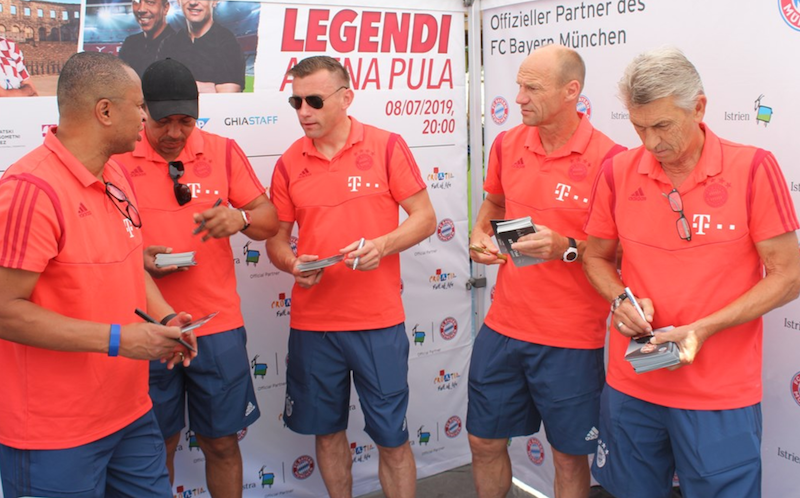
Filip ŠKATAR
The football greats of one of the largest clubs in the world signed photographs, shared club souvenirs and attracted numerous tourists, including many Bavarians and supporters of the club, who could not miss the opportunity for a photo or the chance to take home a valuable souvenir. The Legends of the Croatia national team were not able to address this morning’s crowd, though they will be ready to participate in tonight's spectacle.
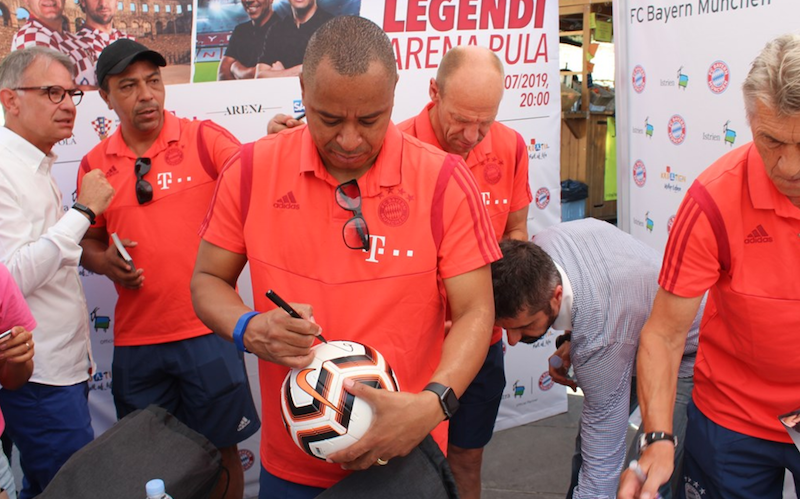
Filip ŠKATAR
Recall, the ancient amphitheater in Pula will transform into a football field for the first time in history for a spectacular sporting event which will feature the legends of Bayern Munich and the legends of the Croatia national team. This spectacle is the result of the strategic partnership between the Istria County Tourist Board and the powerful Bavarian club which was agreed year ago and will continue for three years.
The basic idea of the strategic partnership was to combine two premium brands that would help to identify quality and superior products by linking marketing activities in the offline and online segment, e-marketing, social networks, and a specific marketing campaign in collaboration with Bayern.
The strategic partnership allows Istria to cooperate on nine major marketing projects. All projects are positioned so that they take place in the period that is most important for the tourist promotion of Istria, i.e., the winter months and the preseason.
The Istria County Tourist Board announced the names of some of the Bayern Munich legends we can expect in Pula, including Ivica Olić, Paulo Sergio, Giovane Elber, Martín Demichelis, Luca Toni, Klaus Augenthaler and Marcel Witeczek.
Some of the famous footballers who will represent Croatia are Stipe Pletikosa, Robert Jarni, Ivan Klasnić, Marjan Mrmić, Ardian Koznik, Petar Krpan, and Ognjen Vukojević.
Inside the arena, a small field of 40 meters by 20 meters will installed.
Between the games, the experience will be complemented by a music program and numerous performances, and after the winner is announced, the VIP Lounge in the Arena will continue with an entertainment program and DJs.
Schedule of events:
20:00 - 20:30 Junior’s match
20:30 Event announcement with a presentation of partners and sponsors
Presentation of all teams (two ‘Vatreni’ and two Bayern Munich teams)
Draw
20:50 – 21:15 First semi-final match
21:20 – 21:45 Second semi-final match
21:45 – 21:55 Music program/Performances
22:00 – 22:25 Match for third place
22:30 – 22:55 Final
The games are followed by an awards ceremony and after-party with DJs in the VIP lounge of the Arena.
FC Bayern Munich is the 4th most valuable club in the world and one of the main brands in Germany, and the key is the market. Namely, Germany is Croatia’s most significant and largest broadcast market, and within Germany, Bavaria certainly has the largest share. Thus, the strategic partnership between FC Bayern Munich and Istria is certainly one of the largest and most significant marketing projects in tourism.
To read more about travel in Croatia, follow TCN’s dedicated page.
Reflecting on Russia: Croatia Secured World Cup Semi-final One Year Ago Today
On July 7, 2018, Croatia and Russia met in front of 40,000 fans for the quarterfinal of the World Cup in Sochi. The stadium shook like an earthquake.
It was rumored that Vladimir Putin, the KGB, and special units helped Russia reach this stage of the competition, though nothing could help the host nation that night in Sochi. Croatia won on penalties and thus secured a spot in the World Cup semi-final, reports 24 Sata on July 7, 2019.
Judging by the game against Denmark, after Russia, it was clear the entire country needed psychiatric help, or pills to pop to get them through over 120 brutal minutes. This quarter-final was not for the faint of heart.
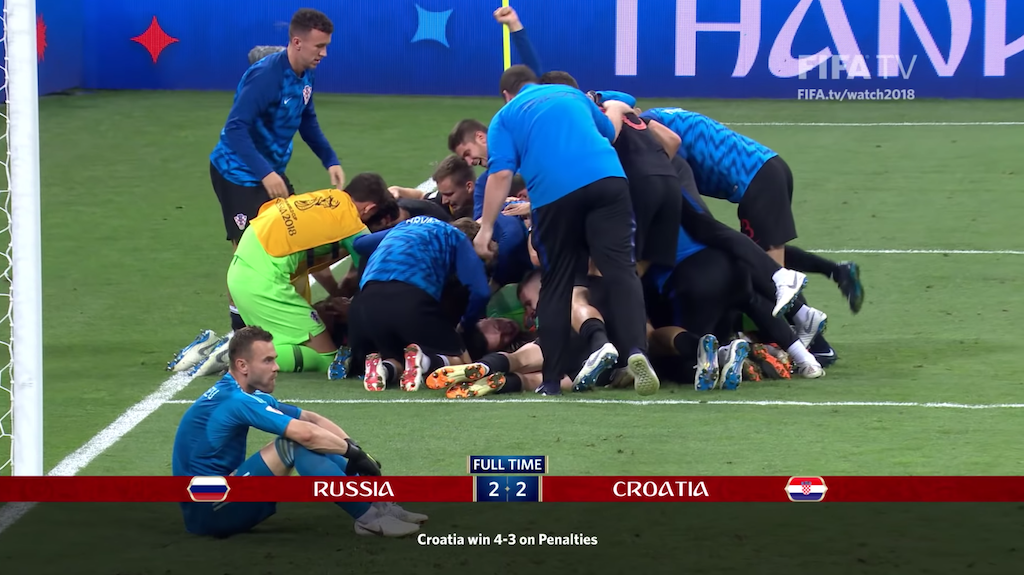
It was a game where Danijel Subašić fought through the pain to magically save a penalty with one foot,
“During the warm-up, I felt pain in my muscle. I massaged my leg and saw that I could continue. The pain came again later, but I did not want to give up, I knew that the coach needed another substitution because many of them complained about problems,” said Subašić.
However, Suba became a hero, a hero of the nation, who eliminated Russia and Denmark.
Many players could barely stand on their feet during the game and looked at the bench after any hope a change could be made.
"I do not know where they gathered their strength, they made a miracle," coach Zlatko Dalić said.
“During the break, masseuses quickly served the players, as in a Formula 1 box. I had a small edema, but I survived, as we survived the entire tournament,” said Subašić.
After 90 minutes, the game was 1:1, and after 120 minutes - 2:2. Croatia's fate would be decided by penalties for the second consecutive game.
But after the team and Croatians across the world spent all of their nerves against Denmark, how would anyone survive this drama again?
“How did I survive through penalties? Here, my stomach is still shaking. Horror, but who cares, we have entered the top four in the world,” said Mario Mandžukić.
Just as against Denmark, the last penalty came down to Ivan Rakitić - and the world stopped. Rakitić scored, and Croatia was off to the World Cup semi-final.
The Croatian players sprinted from the half towards Rakitić, jumped on Zlatko Dalić and embraced Ivica Olić.
And there were tears.
“I cried. No words can describe that feeling at that point, especially when it's over,” says Rakitić.
Before the game, Rakitić said he watched ‘Rocky’, the cult classic with Sylvester Stallone, as a motivator.
Slobodan Kadić
"I watched Rocky fight against Ivan Drago and he wondered if we could do something like that because the Russians were strong, aggresive and tall. But we have come to the victory tonight, like Rocky,” said Rakitić after the game.
Before the game, defender Vedran Ćorluka was certain Croatia would move on.
“They do not have a chance. I know them very well and we are better in all positions, just about all,” said Ćorluka of the Russia team.
"I am experiencing all of the emotions, there is a lump in my throat, I’m crying on the bench, I'm overwhelmed, I could not stop. I was not able to stop the tears, so much happened. The players ran to the penalty box, where they went for Rakitić,” Dalić wrote in his book" Russia of Our Dreams ".
The dressing room celebration lasted for three hours. The team belted “Moja domovina”, “Nije u šoldima sve”, and “Dome moj”.
Croatia finally left without voices, with exhaustion swept across their faces. But who cared. After twenty years, they had repeated Croatia's greatest success and secured a spot in the World Cup semi-final.
And their World Cup fairytale continued.
To read more about sport in Croatia, follow TCN's dedicated page.
Program Announced for Bayern Munich and Croatia Legends Match at Pula Arena
June 25, 2019 - The football legends of Bayern Munich and the Croatia national team will meet at the Pula Arena on July 8, as part of a spectacular program prepared by the Istria County Tourist Board. The ancient amphitheater will transform into a football field or, more accurately, due to the lack of space, a futsal field, for the very first time.
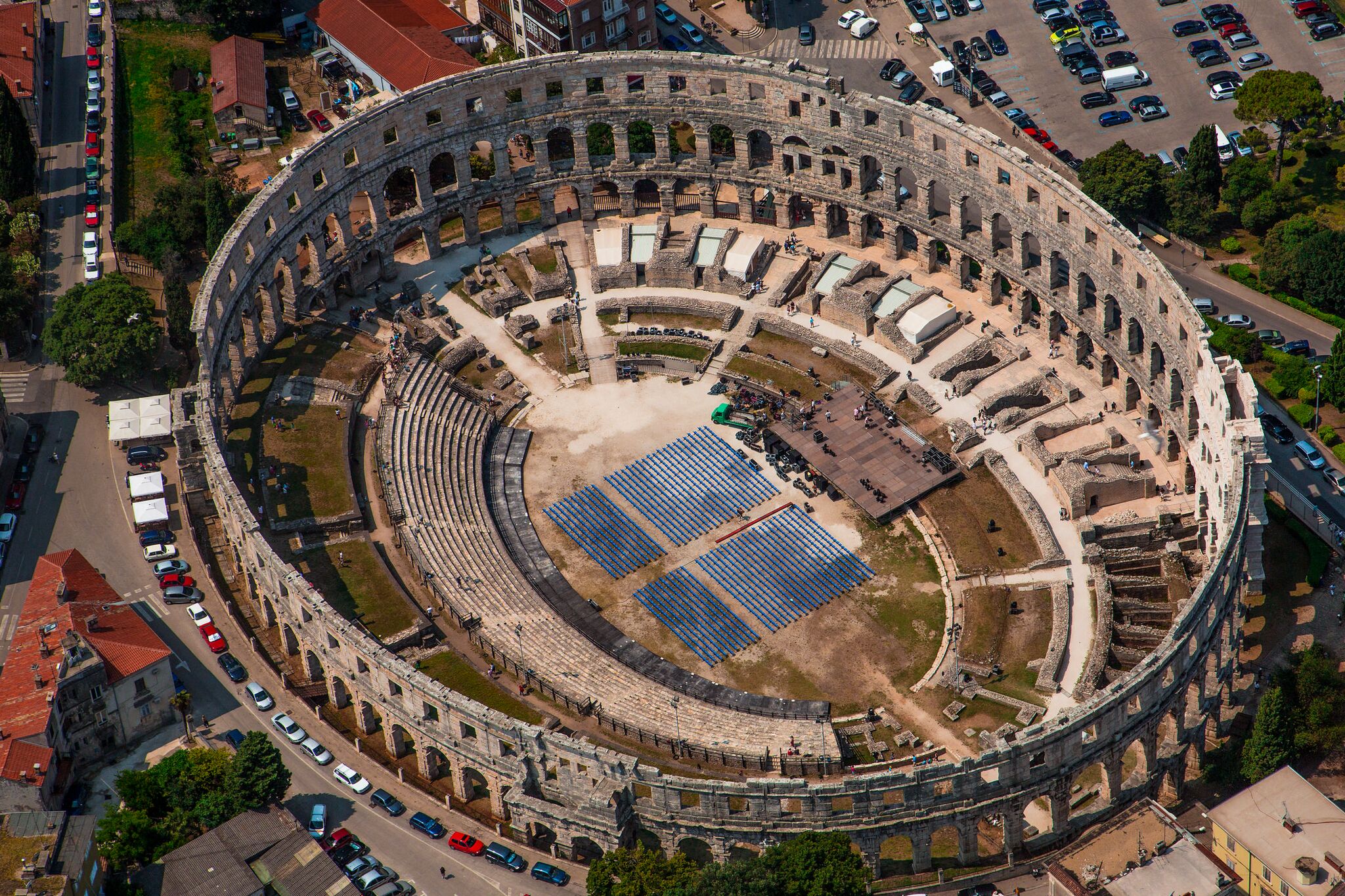
Copyright Romulic & Stojcic
The Istria County Tourist Board announced the names of some of the Bayern Munich legends we can expect in Pula, including Ivica Olić, Paulo Sergio, Giovane Elber, Martín DeMichelis, Luca Toni, Klaus Augenthaler and Marcel Witeczek.
Some of the famous footballers who will represent Croatia are Stipe Pletikosa, Robert Jarni, Ivan Klasnić, Marjan Mrmić, Ardian Koznik, Petar Krpan, and Ognjen Vukojević.
Inside the arena, a small field of 40 meters by 20 meters will installed. Presale tickets can be purchased online at ticketshop.hr. Prices begin at 12 euro, and proceeds will be directed to humanitarian purposes.
Between the games, the experience will be complemented by a music program and numerous performances, and after the winner is announced, the VIP Lounge in the Arena will continue with an entertainment program and DJs.
Presale tickets can be purchased at ticketshop.hr, at all Tisak selling points, and the box office in front of Arena on the day of the event.
Schedule of events:
20:00 - 20:30 Junior’s match
20:30 Event announcement with a presentation of partners and sponsors
Presentation of all teams (two ‘Vatreni’ and two Bayern Munich teams)
Draw
20:50 – 21:15 First semi-final match
21:20 – 21:45 Second semi-final match
21:45 – 21:55 Music program/Performances
22:00 – 22:25 Match for third place
22:30 – 22:55 Final
The games are followed by an awards ceremony and after-party with DJs in the VIP lounge of the Arena.
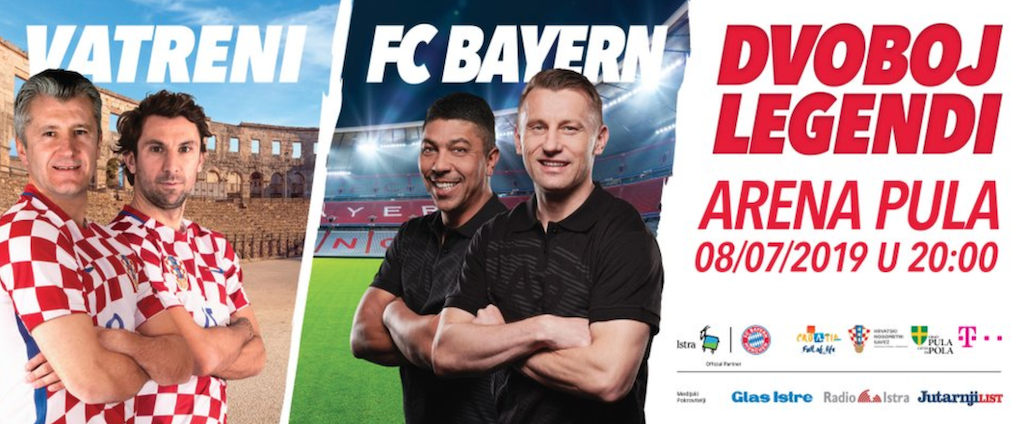
This event is the result of the strategic partnership of Istria and FC Bayern, which was signed in June last year for three-year cooperation.
Before the friendly match, from June 25 to 27, there will be about 110 representatives of the management of the German first-division club, co-owners and strategic partners of Bayern.
The strategic partnership is the largest and most important marketing project in Istrian tourism, and it is also a strategic project in positioning Istria as a destination.
The basic idea of the strategic partnership was to connect two premium brands which would be identified by their quality and top-class products through the networking of marketing activities offline and online, e-marketing, social networks and concrete marketing campaigns in cooperation with Bayern.
In the framework of the strategic partnership, the Istria County Tourist Board has contracted 10 marketing projects to use the strength of the FC Bayern Munich brand and thus incorporate a part of the image and reputation of Bayern into the brand of Istria. This contract represents the biggest and most powerful advance of Istria as a destination in the marketing sense, and the effects of this partnership will have an impact on the global level, primarily thanks to the popularity of the legendary club around the world.
The organizer, the Istria County Tourist Board, promises an unforgettable and unprecedented experience for everyone.
To read more about sport in Croatia, follow TCN's dedicated page.
Hajduk, City of Split, and HNS Meet: National Team WILL Play at Poljud
June 24, 2019 - Hajduk, the City of Split, and HNS held a historic meeting at Poljud to discuss, among a laundry list of items, the Croatia national team’s arrival in Split for the first time since 2015, and just the third time in 20 years.
The City of Split and the Croatian Football Federation met on Monday at 10:30 at Poljud Stadium in Split. The City, as the majority owner of the stadium, invited representatives of HNK Hajduk to the meeting. The central theme was, of course, the Euro 2020 qualifier between Croatia and Hungary on October 10, though equally as important was mending the relationship between Hajduk and HNS to better Croatian football for good.
Eight HNS representatives came to Split, including Executive Director Marijan Kustić, and Vice Presidents Damir Misković and Ante Kulušić. The President of HNS, Davor Šuker, did not attend the meeting. Hajduk’s delegation was led by Marin Brbić and the City of Split by Mayor Andro Krstulović Opara. The police secured the meeting, and in total, 16 people participated.
The meeting did not end until almost 4 pm and Split Mayor Andro Krstulović Opara was the first to address the media.
“I am very pleased to announce that at today's meeting, HNS was able to agree with many of Hajduk's requests. We want to finally solve the problem of non-communication between HNS and Hajduk in favor of Croatian football and football in southern Croatia. I look forward to hosting the Croatia national football team in Split,” said Andro Krstulović Opara.
“I look forward to continued cooperation. I look forward to the Croatia national team at Poljud.”
Hajduk president Marin Brbić addressed the media next.
"I'm pleased to say that we finally started communicating with HNS. We will discuss each issue individually. We've always wanted the national team here. Today we felt a hint that something might change. The national team was never disputed, and we will continue to monitor the development of the situation.
We had a good, quality meeting. It will take time to solve each item, but it is important that there is a will and desire. I look forward to the arrival of Hungary in Split in cooperation with the City, and we will work to include Hajduk.”
Hajduk will not participate in the organization of the match, and will join the moment problems begin to resolve, Brbić added.
Recall, Hajduk said on Saturday that “without any concrete changes in relations with HNS, they will not change their attitude" and will not participate in the organization of the match.
The City of Split, as the majority owner of the stadium, unanimously voted at last week's City Council session to host the match in Split, but with a preliminary apology from the top of HNS.
The HNS Executive Committee at its session on June 12 decided that the Euro 2020 qualifier between Croatia and Hungary would be played at Poljud, but failed to inform Hajduk or the City of Split of their decision, which questioned the game happening in Split at all.
To read more about sport in Croatia, follow TCN’s dedicated page.
Hajduk, City of Split, and HNS to Hold Historic Meeting at Poljud on Monday
June 23, 2019 - On Monday, June 24, at 10:30 am, a meeting between the City of Split and the Croatian Football Federation will be held at Poljud. The City of Split, as the majority owner, invited representatives of HNK Hajduk to attend the meeting, the Split club officially confirmed on Saturday.
In their recent statement, Hajduk presented their position on relations between the Club and the Federation and consequently where the Euro 2020 qualifier between Croatia and Hungary would be held.
“On this occasion, HNK Hajduk clearly emphasizes how they firmly stand behind their statement and that their attitude will not change without any concrete changes in the relationship.
The Club is ready to actively participate in the meeting on Monday at Poljud exclusively to talk about the first steps towards more transparent and fairer relations with all clubs, to overcome the problems that have accumulated over the years. Only when these changes occur, or when we are convinced that the HNS leaders have translated their words into concrete actions, HNK Hajduk is ready to take on an active role in the process of organizing one of the next national team games,” Hajduk concluded on their official website.
Recall, HNS announced that the Croatia national team would play their next home qualifier for Euro 2020 against Hungary at Poljud, though they failed to inform Hajduk or the City of Split of the news. As you can imagine, this was considered poor play by the Federation who is allegedly ‘trying’ to mend the relationship with Hajduk and Split. You can read more about that here.
Whether the game would be played in Split at all seriously came into question as a result of the saga, and Hajduk released a statement rejecting that they were the obstacle standing in the way of it happening at all.
“We have repeatedly stated that we are eagerly awaiting the arrival of the Croatia national team at Poljud. However, how HNS communicates with the Club and its supporters, the City of Split and its inhabitants, has been the reason why for several years, and especially recently, we have reason to doubt whether the Federation’s decision is sincere and of good intentions. Moreover, the question is whether the Croatian Football Federation is aware of the real mood of the fans in Split and Dalmatia,” Hajduk said.
About the fans in the region, the club went on to say that the game shouldn’t be forced under these circumstances or organized at all costs, and that the national team does not deserve to be exposed to such division, but an atmosphere of communion and the unity of fans.
“The Croatian national team has not played in Split for too long. From 1998 until now, there were 66 official matches in Croatia, of which only two were played in Split! Of these two, one was played without fans. Therefore, the next national team appearance at Poljud deserves an atmosphere of strong support, without the unresolved problems in Croatian football. The Croatian Football Federation must accept its part of the responsibility for it, and not incorrectly transfer all of the responsibility to HNK Hajduk and the City of Split with the view that ’it is all on them, whether they want the national team in Split or not’.
We can achieve this goal, but only in an atmosphere of mutual respect, reasoned dialogue, and clear and measurable goals for the prosperity of all Croatian football. Croatia is ours and we want it at Poljud."
You can read the statement in its entirety here.
HNK ended by inviting HNS's executive director Marijan Kustić to a meeting where HNK Hajduk would present their attitudes and intentions.
“Open conversations and an atmosphere of real dialogue have no alternative. They are a prerequisite for solving the accumulated problems.”
A few days after Hajduk’s press release, the Split City Council announced the arrival of the Croatia national team at Poljud but also expects changes at the root of HNS.
With 25 votes for (from 26 councilors), the council unanimously decided that Croatia would play against Hungary at Poljud. However, changes at the root of HNS's relationship with the City of Split and Hajduk was demanded, as is an apology from HNS and a quick agreement from the Federation that all sides would get together as soon as possible.
You can read the City of Split’s statement in full below:
The Split City Council wants the Croatia national football team in our town for the official qualification match against the national team of Hungary at Poljud stadium.
The Split City Council demands from the Croatian Football Federation a rooted change in the current relationship between the leadership of the Croatian Football Federation towards the City of Split and the Croatian football club Hajduk, which is best reflected by the fact that Croatia has only played two official matches in Split in the last 20 years, one of which was played without the public.
Due to the many years of an inappropriate and unacceptable relationship with our city and club, an apology by the Croatian Football Federation is needed as an act of goodwill and a step towards recovering Croatian football and strengthening its communion.
In the interest of Croatian football, we are looking for an agreement at a meeting between the Croatian Football Federation and HNK Hajduk, in the presence of representatives of the City of Split, related to achieving a solution for the numerous deviations and the accumulation of problems that have burdened Croatian football for a long time, as well as an agreement on organizing the desired football match in our city of Split, said the Split City Council.
To read more about sport in Croatia, follow TCN's dedicated page.

